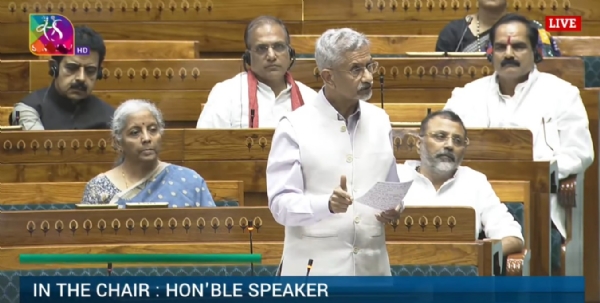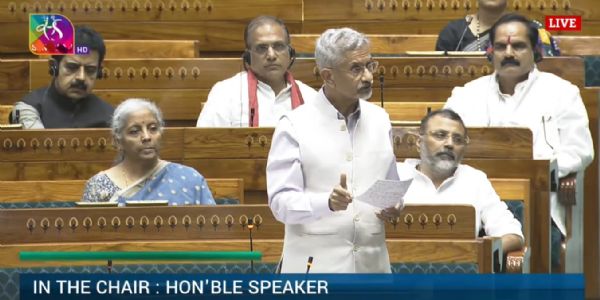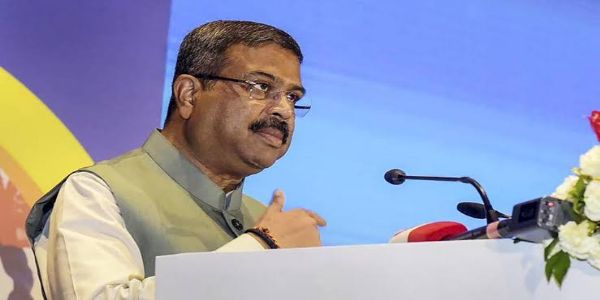
New Delhi, July 28 (H.S.): External Affairs Minister Dr. S. Jaishankar responded to Rahul Gandhi's concerns in the Lok Sabha regarding the China-Pakistan alliance during discussions on Operation Sindoor. He critiqued previous Congress-led governments for inaction in foreign policy, particularly concerning China, referencing a proposed regional trade agreement in 2006 and the reliance on foreign technology. Jaishankar highlighted the current government’s commitment to indigenous technology, especially in developing 5G capabilities, contrasting this with the Congress government's neglect of border matters with Pakistan and China. He noted that the present government has prioritized border infrastructure development compared to the Congress era.
Jaishankar pointed out that the Maldives had previously excluded an Indian company from airport projects while under Congress, now inviting collaboration instead. He drew attention to Sri Lanka's Hambantota port, built during Congress's tenure and now under Chinese control. He was critical of the previous government's approach to negotiations with Pakistan, suggesting that it often failed to hold Pakistan accountable after terrorist attacks, implying that Congress treated Pakistan as a victim rather than a perpetrator of terrorism.
Addressing the opposition's criticisms regarding Operation Sindoor and India's response to terrorism, Jaishankar contrasted the current government's decisive actions with the Congress response after the 2008 Mumbai attacks, asserting that the past government's policy was marked by inaction. He criticized the Congress for having accepted terms that led to India's perceived hyphenation with Pakistan during international discussions. Jaishankar asserted, “People who did nothing have the temerity to question the government which brought down Bahawalpur and Muridke terror sites,” emphasizing India's proactive stance under the current administration.
Furthermore, Jaishankar acknowledged India's diplomatic successes, such as designating The Resistance Front (TRF) as a global terrorist organization, and defended the credibility of parliamentary delegations that traveled to 33 countries post-Operation Sindoor, rebuffing misinformed critiques of their reception abroad. He explained that these delegations successfully communicated India's position on terrorism.
In addressing his visit to China for the SCO Foreign Ministers’ meeting, Jaishankar clarified that he did not go for superficial reasons like attending the Olympics but to assert India's position on de-escalation, trade restrictions, and terrorism. He noted China’s actions during international events and highlighted the government's focus on developing an indigenous technology ecosystem contrasting with previous administrations’ reliance on Chinese telecom infrastructure.
Jaishankar dismissed the concerns raised by the opposition regarding the long-established Pakistan-China collaboration, including attempts to create a narrative around its novelty. He specifically pointed out that Rahul Gandhi sought briefings from the Chinese ambassador during the Doklam crisis rather than from the Indian government. This further laid the foundation for his argument on the necessity of a resilient and assertive stance on national security and diplomacy.
Critiques from Congress members included questioning the abrupt halt of Operation Sindoor, suggesting that it was influenced by international pressure—claims that Jaishankar refuted by emphasizing India’s independence and strategic choice in foreign policy. He responded to the assertion that Pakistan and China were gaining confidence due to mutual support, expressing that concerns over the China-Pakistan nexus had been raised for decades now, stressing that it was a long-standing geopolitical issue.
In closing, Jaishankar laid out the strategic philosophy guiding Operation Sindoor, which he framed as heralding a new normal in India's approach to cross-border terrorism. The approach rests on five key pillars: treating terrorists as non-proxies, retaliating against cross-border terrorism, ensuring dialogue does not accompany acts of terrorism, refusing to yield to nuclear threats, and recognizing that a peaceful neighborhood cannot coexist with violence. These principles underscore a shift towards a more rigorous anti-terror doctrine in Indian foreign policy.
Hindusthan Samachar / Jun Sarkar







